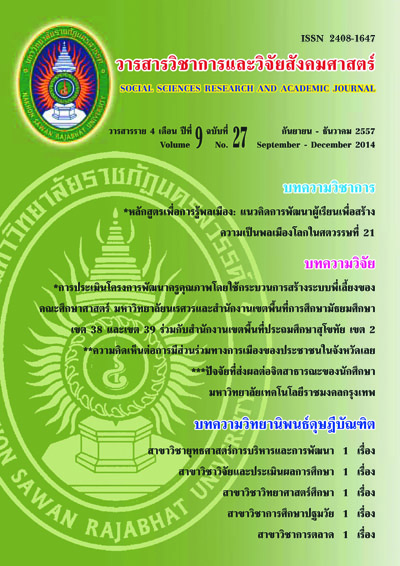หลักสูตรเพื่อการรู้พลเมือง: แนวคิดการพัฒนาผู้เรียน เพื่อสร้างความเป็นพลเมืองโลกในศตวรรษที่ 21 ; Citizenship Literacy Curriculum: The Perspectives for Developing Students for Global Citizenship in the 21st Century
Main Article Content
Abstract
บทคัดย่อ
บทความฉบับนี้มีวัตถุประสงค์เพื่อนำเสนอแนวคิดในการพัฒนาความเป็นพลเมืองไทยอันเป็น
รากฐานสำคัญของการพัฒนาความเป็นพลเมืองโลกในเด็กและเยาวชนไทย โดยแบ่งเนื้อหาสาระ
ออกเป็น 3 ส่วน ได้แก่ 1) คุณลักษณะความเป็นพลเมืองในมิติใหม่ 2) หลักสูตรเพื่อการพัฒนาความเป็น
พลเมือง: แนวคิดและกรณีตัวอย่าง และ 3) การพัฒนาหลักสูตรเพื่อการรู้พลเมือง: กรณีหลักสูตรอาเซียน
ศึกษา การนำเสนอประเด็นดังกล่าวเพื่อเป็นหลักคิดสำหรับนักวิชาการด้านหลักสูตรและการสอน
นักการศึกษา ครูอาจารย์ และผู้ที่มีส่วนเกี่ยวข้องกับการจัดการศึกษาให้หันกลับมาพิจารณาว่า “หลักสูตร
เพื่อการรู้พลเมือง” มีลักษณะอย่างไร เหตุใดจึงต้องมีหลักสูตรเพื่อการรู้พลเมือง และมีความสำคัญต่อ
การจัดการศึกษาเพื่อความเป็นพลเมืองในบริบทไทยอย่างไร ท้ายที่สุดการพัฒนาหลักสูตรเพื่อการรู้
พลเมืองจะต้องมีฐานมาจากกระบวนการคิดไตร่ตรองเชิงวิพากษ์ของผู้ที่เกี่ยวข้องกับการพัฒนาหลักสูตร
เพื่อให้หลักสูตรสามารถพัฒนาความเป็นพลเมืองโลกให้แก่เด็กและเยาวชนไทยได้อย่างแท้จริง
Abstract
The objective of this article was to propose the perspectives for developing Thai citizenship
which is the important foundation for developing global citizenship in Thai children and youth. The
contents were divided into 3 parts: 1) the characteristics of citizenship in new dimension, 2) curriculum
for citizenship development: concepts and examples and 3) the development of citizenship literacy
curriculum: ASEAN studies curriculum. The proposed perspectives aimed at provoking curriculum and
instruction scholars, education specialists, teachers and related people to reconsider about the
characteristics and the essence of citizenship literacy curriculum and the importance of citizenship
literacy curriculum for citizenship education in Thai contexts. Finally, the development of citizenship
literacy curriculum should be emerged from critical reflective thinking process of the people involved in
curriculum development. Therefore, the curriculum can significantly contribute to the development of
global citizenship in Thai children and youth.


